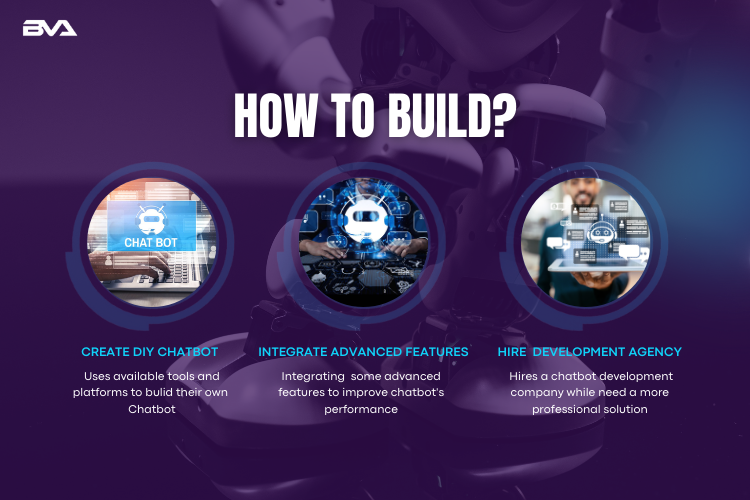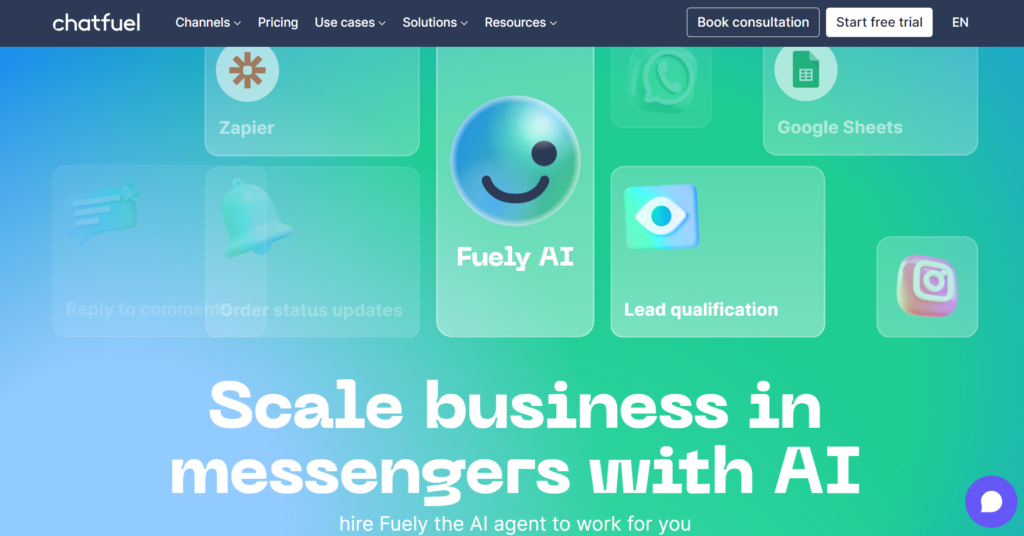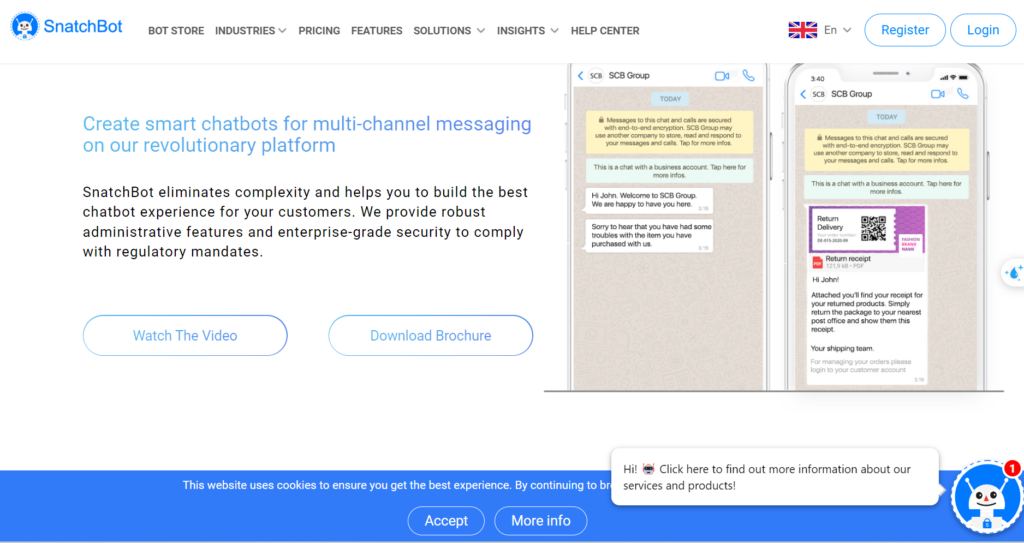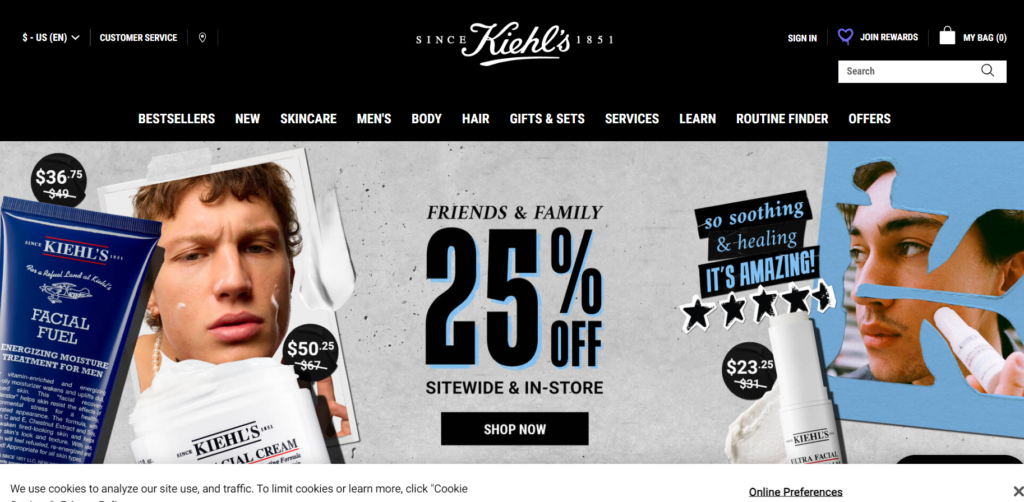According to Gartner, it is expected that by 2025, about 60% of e-commerce businesses will use artificial intelligence (AI) technologies to optimize production and business operations processes. In addition, most retailers today use AI as a tool to predict shopping patterns, thereby optimizing user experience, and store services and increasing conversion rates. For example, according to Amazon’s report, after applying a recommendation system incorporating AI, the rate of customers finding products that suit their needs has doubled. It can be seen that the application of E-commerce AI Chatbot is becoming an important trend today.
E-commerce AI Chatbot is a good solution to enhance interaction between businesses and customers. They are designed to understand, process, and answer user questions in real time. This capability also extends to more complex tasks, such as providing product recommendations, assisting with order tracking, managing returns and refunds, and even engaging in sentiment analysis to gauge customer satisfaction. From there, customers both have their problems solved and their shopping experience upgraded.
This article will discuss E-commerce AI Chatbot with their features, the best solutions to build your own E-commerce chatbot, use cases, and success stories.
I. What is an E-commerce AI Chatbot?
E-commerce AI Chatbot is a type of chatbot developed based on artificial intelligence (AI) that is applied by online retailers to attract customers. E-commerce stores can use these chatbots to answer questions about their products directly on the website, make product recommendations, and even conduct sentiment analysis, thereby upgrading customer experience.

Three types of E-commerce Chatbot:
| Feature | Simple Rule-Based Chatbot | Intelligent Chatbot with Advanced AI | Hybrid Models Combining Both Approaches |
| Technology | Predefined rules and scripts | Machine learning, NLP | A combination of rule-based systems and advanced AI |
| Complexity | Low | High | High |
| Maintenance | Easy | Complex | Medium |
| Response Quality | Limited to predefined responses | Highly adaptive and context-aware | Balances predefined responses with adaptive learning |
| Cost | Low | High | High |
| Customer Experience | Basic | Highly personalized | Balancing between consistency and personalization |
| Integration Capabilities | Easy to integrate with existing systems | Complex, needs to integrate with multiple systems and data | Moderate, depending on the level of AI integration and rules |
II. Why choose Ecommerce AI Chatbots
The trend of applying E-commerce AI Chatbots to improve customer experience, streamline operations, and boost sales is increasingly popular with retailers. Here are some key benefits:
2.1. Providing 24/7 customer support
Chatbots can provide automatic support 24/7 without the intervention of employees. It helps customers receive quick answers at all times, providing product and service information, and process instructions. ordering and payment and technical problem-solving or after-sales support.
2.2. Multilingual Support for Global Customer base
This is one of the essential features, especially for businesses serving a global customer base. AI Chatbot can communicate effectively with customers in different languages, helping businesses attract and expand their customer base, thereby increasing sales and updating market trends. and enhance customers’ shopping experience.
2.3. Facilitating sales and customer engagement
Chatbots for online shopping have the ability to analyze and understand human emotions, thereby creating a more personalized interactive experience, helping to strengthen connections, and making the shopping experience more natural and intimate. This feature is also especially important in managing sensitive tasks such as order processing and refunds, helping to reduce stress and increase user comfort during shopping and website interactions.
2.4. Handling mundane, time-consuming, and repetitive tasks
E-commerce AI Chatbot can flexibly integrate between e-commerce platforms such as Shopify, Magento, WooCommerce,… along with customer relationship management (CRM) systems, thereby helping businesses save money. time and effort during implementation and management. Moreover, Ai Chatbot also supports automatically updating and managing customer, order, and transaction data, and can then analyze, evaluate and propose business strategies to effectively improve performance. effective for businesses.

III. How to build your own AI Chatbot for E-commerce
E-commerce AI Chatbot has become a vital tool in implementing effective marketing strategies, generating leads, and converting sales. The problem is “How to create your E-commerce AI Chatbot?”. So let’s find out together.
3.1. Create DIY Chatbot
Currently, there are many available tools and platforms to support businesses in building their own AI Chatbots. The advantage of these platforms is their ease of use and customization in handling common e-commerce tasks such as product inquiries, order tracking, and customer service.
There are some best AI Chatbot for e-commerce platforms that offer a beginner-friendly interface for creating chatbots without extensive coding knowledge:
- Tidio
- Giosg
- Netomi
- Ada
- Chatfuel
- Snatchbot
- Pandorabots
3.2. Advanced Features and Integrations
In the process of building an AI Chatbot for eCommerce, to enhance functionality, you should consider integrating with many other features. This includes multilingual support, voice recognition capabilities, natural language processing for personalized product recommendations, or integration with CRM systems to better manage customer data. Integrating these advanced features can significantly improve your chatbot’s performance, delivering a richer and more engaging experience for your customers.
3.3. Hire an AI Chatbot development agency
If you are not a technology expert or need a more professional solution to build a chatbot yourself, hiring a chatbot development company is a viable option. These companies specialize in creating chatbots that integrate a variety of advanced features, such as deep learning algorithms to better understand customer preferences and integration with complex backend systems.

IV. Best Ecommerce AI Chatbot platforms
There are some AI Chatbot for Ecommerce platforms that offer a beginner-friendly interface for creating chatbots without extensive coding knowledge: Tidio, ProProfs Chatbot, Chatfuel, Snatchbot, etc.
4.1. Tidio
Tidio is a platform that uses deep learning technology and Natural Language Processing (NLP) technologies to provide comprehensive services for businesses. Businesses can support customers anytime, anywhere, ensuring that customers will not miss any information or offers.
- Features:
- Create sample conversations
- Intuitive builder interface
- Ability to integrate with multiple platforms (MailChimp, Zapier, etc.)
- Expense:
| Plan | Pricing |
| Free plan: For new businesses seeking to start offering great customer service. | 0 USD/month |
| Starter plan: Ideal for small businesses focused on enhancing customer satisfaction via live chat support. | 24.17 USD/month |
| Growth plan: Ideal for teams of all sizes prioritizing customer service as their competitive advantage. | 49.17 USD/month |
| Tidio+: For businesses requiring better limits, additional integrations, advanced features, and premium support. | 749 USD/month |
4.2. ProProfs Chatbot
ProProfs Chat is similarly a live chat platform that allows businesses to provide instant support to their customers. Not only does it help manage real-time conversations, this solution also attracts potential customers with many outstanding features.
- Features:
- 24/7 help
- Multilingual support – Chat with your customers in their language
- Respond to conversations from social media channels
- Integration with third-party tools like Microsoft Dynamics CRM, Salesforce, Magento, Shopify, ZenDesk, WordPress, Drupal, etc.
- Track customer ratings
- Check and report operator performance
- Expense
| Plan | Pricing |
| Single Operator | 0 USD/month |
| Team (2+ Operator) | 29.99 USD/month |
4.3. Chatfuel

Founded in 2015, Chatfuel offers various editing tools that allow you to design your chatbot as you like and set up chat rules on the dashboard. The software uses NLP to understand and recognize phrases and will send users predetermined answers.
- Feature:
- Automatically store customer information in the database after chatting.
- Increase sales by recommending related products.
- Generate and identify leads from comments and ads.
- Integrates with Shopify Live Chat, Google Sheets, Livechat, and Integromat
- Live analysis of interactions made with chatbots.
- Expense: For Facebook and Instagram:
| Plan | Pricing |
| Business | 14.99 USD/month |
| Enterprise | 300 USD/month |
4.4. SnacthBot

SnatchBot helps businesses create intelligent chatbots for cross-channel messaging across the platform. SnatchBot eliminates complexity and helps businesses build the best chatbot experiences for their customers. They provide powerful administration features and enterprise-grade security to comply with legal regulations.
- Feature:
- Cross-platform integration
- Natural language processing
- Customizable Chat Bot Template
- Powerful analytics dashboard
- Bot building interface without code
- Advanced security measures
- Expense: For Pro-plan
| Plan | Pricing |
| Starter | 99$/month |
| Team | 199$/month |
| Business | 449$/month |
| Enterprise | depends on request |
V. E-commerce AI Chatbots Use Cases
How can AI help e-commerce? You should know that AI Chatbots in e-commerce are flexible tools that you can use to streamline some of your sales, marketing, and service operations. There are 5 popular use cases as follows.
5.1. Customer support and problem-solving
E-commerce AI chatbots are designed to offer customers 24/7 support and resolve multiple cases, significantly improving customer experience and reducing support wait times. It allows service teams to simplify their workflows by providing answers and solutions to simple (or common) issues and frequently asked questions.
5.2. Automate sales and marketing opera
Chatbots for online shopping can guide customers through the shopping process, providing personalized product recommendations based on the customer’s preferences and browsing history. They can answer questions about product features, availability, and comparisons to help customers make appropriate decisions.
5.3. Upsell and cross-sell strategies
By analyzing based on the customer’s current product categories or previously purchased products, AI Chatbot can recommend additional or upgraded products (upsells) and complementary items for customers. This strategy not only increases sales but also improves the customer’s shopping experience by providing them with options they may not have considered.
5.4. Prevent and fix shopping cart abandonment
Many customers tend to have placed items in their shopping cart but have not yet decided to buy due to a lot of confusion. Chatbots can solve this problem by attracting those customers with reminders with incentives such as discounts. or free shipping to encourage completed purchases. In addition, the chat bot will also collect detailed information about why customers abandoned their shopping carts, helping businesses find quick and effective solutions.
5.5. Collect customer feedback and conduct surveys
AI chatbots can interact with customers after a purchase to understand more about their shopping experience. This is important information for businesses to improve their products, services and overall customer experience.
VI. Success Stories and Case Studies
Some reports from Invesp reveal that more than 67% of consumers worldwide have used a chatbot for customer support in the past year. In fact, many brands have achieved incredible success from integrating Chatbots for online shopping:
#1. H&M
H&M‘s chatbot stands out as fashion support. It interacts with customers to understand their style preferences, then suggests outfits and individual clothing items. This interactive shopping experience not only helps customers make purchasing decisions, but also drives sales by introducing a wider range of H&M products.

#2. Kiehl’s
Kiehl’s has applied AI Chatbot to give personalized skin care advice to their customers. After receiving information about the customer’s skin type and problem, the chatbot will recommend products that suit their needs. This personalized approach not only enhances customer satisfaction but also increases the likelihood of customers purchasing recommended products.

#3. Gymshark
Gymshark has a website chatbot for shopping that facilitates customer engagement and provides post-purchase information like order status, shipping updates, delivery details, and returns. It also offers a help center for fixing issues you may likely encounter.

Final Thoughts
In summary, Ecommerce AI chatbots are reasonable choices for businesses. These tools not only enhance customer service, providing sophisticated customer interactions, but also increase operational efficiency and save costs. For e-commerce businesses, adopting AI chatbots is essential to stay competitive in the digital era. Therefore, investing in Ecommerce AI Chatbot is a strategic step towards long-term growth and innovation in business commerce.
If you want to learn more about the process of creating your own AI Chatbot for your store, come to Bavaan. With a professional technology team with many years of experience, all your questions will be answered!



